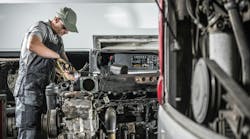When we think of technological developments that take a long time to make it to market we most likely think of thinks like engines, transmissions and new cab designs. We realize that design engineers work for years on components like this and that they go through round after round of test.
But did you know that new oil formulations take years and years to develop as well. Take the newest engine oil CK-4 and FA-4. The EMA and TMA first requested a new heavy-duty engine oil performance standard back in June of 2011. Their request was driven by U.S. EPA regulations mandating improved fuel efficiency for heavy-duty on-highway diesel engines and trucks. The GHG standards would be achievable in part because of the performance of the engine oil.
Improvements sought included more oxidation stability, aeration benefits, improved shear stability, more scuffing/adhesive wear control and compatibility with biodiesel blends.
When a new oil is developed it must undergo rigorous testing both engine bench tests and in trucks on the road to ensure it meets API performance specifications. In fact a major part of designing an oil specification is coming up with the test that oil must pass before it can be sold. For these new oils tests were developed to see how the oils handled oxidation stability and aeration control.
Oil suppliers spend millions of dollars on this testing to ensure the oils will do what they claim to do.
This should bring you some peace of mind as you shift your fleet to these new oils because of the countless hours and resources that have been spent ensuring that these oils will, in fact, perform as expected.
And what we found during our work on a Confidence Report on low viscosity engine lubricants is these well tested oil will allow you to achieve fuel savings of 0.5% to 1.5% if you switch from 15W-40 to the new 5W/10W-30 and an additional 0.4% to 0.7% when switching from FA-4 oils to CK-4 5/10W-30 oils. And as importantly these new engine lubricants will provide the same engine protection you have come to expect.
Better fuel economy without a degradation of performance, now that is something to have confidence in.


